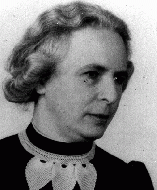
Anna Pfeffer
Born: November 19, 1885
Frankenthal, Germany
Anna, affectionately known as Aennchen to her family, was the daughter of non-religious German-Jewish parents. Her father died when she was young and Anna was raised in the town of Bruchsal by her impoverished mother. Anna married a well-to-do, older gentleman in 1905 and moved to the fashionable city of Duesseldorf, where he was a department store manager. By 1933 they had two grown sons.
1933-39: The Pfeffer's comfortable life unraveled after the Nazis came to power. The Nazis arrested Anna's brother and deported him to a concentration camp, where he was murdered. Anna's oldest son, who had married a Dutch woman, emigrated to the Netherlands. After her husband lost his job and after the November 1938 pogrom, the Pfeffers also emigrated to the Netherlands. There, they joined their oldest son and daughter-in-law.
1940-44: Anna's husband passed away, and she spent her time in Amsterdam with her grandchildren. In May 1940 the Germans occupied the Netherlands. Jews were ordered to register and their rights were curtailed. Like other Jews, Anna lost whatever property she had. A year after being required to wear an identifying yellow badge, she was separated from her family and sent to Westerbork, a transit camp for Jews. Four months later, she was deported to the Theresienstadt ghetto in Czechoslovakia.
On October 9, 1944, Anna was deported from Theresienstadt to Auschwitz, where she was gassed two days later. She was 58 years old.